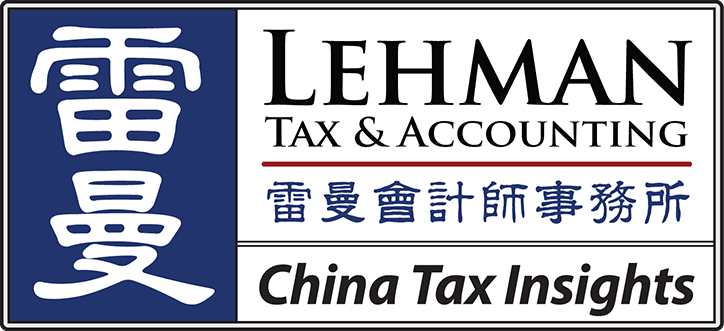

|
|
|
|
LEHMAN, LEE & XU
|
|
January 2011
|
|
|
| Resource tax to be expanded nationwide |
|
CHINA DAILY: China's Finance Minister Xie Xuren said the country will extend the resource tax - currently only in force in the Xinjiang Uygur autonomous region - to other areas in the coming five years while stepping up a revision of the country's fiscal and tax system. |
| China 'unlikely' to reduce export rebates |
CHINA DAILY: China expects to maintain the stability of its export-related policy, and it is "highly unlikely" that the country will reduce export rebates for highly polluting and energy-intensive industries "during the first half", said a senior Ministry of Commerce (MOFCOM) official. |
|
|
| Newsbites | |
|
More buyers seal home deals ahead of likely property tax
|
China levies anti-dumping tariff on scanners
|
|
Tax speculation drives housing sales
|
Tax Deduction & Exemption Available For Post-Disaster Reconstruction Of Zhouqu
|
|
SAT Clarifies Income Tax Rules On Technology Transfer By Resident Enterprises
|
Shanghai gets OK for property tax
|
|
Chongqing to launch 'high-end' property tax
|
EU to cut punitive China fiberglass tariff
|
|
China's 2010 tax revenue up 22%
|
Property tax aims to squeeze real estate bubble
|
|
Hainan kicks off tax refund program for overseas visitors
|
Axing of resource tax proposed
|
|
Mainland, Taiwan jointly reduce import tariffs to implement landmark trade pact
|
China to add more items to tariff reduction catalog
|
|
Export tax to be raised on rare earth
|
MOF Standardizes Administrative Process For Use Of Donation Receipts
|
|
VAT Rules On Sugar Cane Bagasse Products For Multiple Use Further Specified
|
Four Ministries Announce Favourable Tax Policy For Supporting And Facilitating Employment
|
|
State Council Approves 2011 Customs Tariff Implementation Plan
|
SAT Clarifies Individual Income Tax Rules On Transfer Of Shares
|
|
Next Year 10% Purchase Tax To Be Levied On Vehicles With Engines Of 1.6 Litres Or Less
|
SAT Regulates Administration Of Tax Refunds At Deregistration Of Real Estate Enterprises
|
|
|
|
|